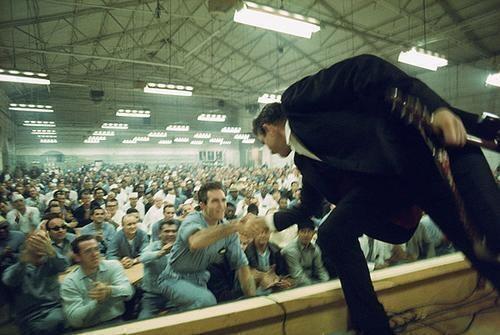JOHNNY CASH PLAYED BOGGO 45 YEARS AGO...
)
JOHNNY CASH PLAYED "BOGGO"
45 YEARS AGO...
TEX PERKINS - FAR FROM FOLSOM
BOGGO ROAD GAOL
Special Event - 17,18, 19 November 2016
Forty-five years ago, when Johnny Cash first came to Australia in March 1971, the "Man in Black" was at the high of his fame. John's passion to play live for his fans led him to come down under on the back of a relentless tour circuit that had criss-crossed the U.S.A.
A little known detail is that John wanted his music to reach everyone - including those inside the worst jail in Australia.
Boggo Road's reputation extended far beyond the Queensland border. The Sunshine State then was regarded as a police state, ruled by Premier Joh Bjelke-Petersen and an assembly of corrupt cops and criminals. If there was a place where the sun never shone, it was inside the walls of "Boggo".
So through Boggo's gates strode Johnny Cash, a living legend, somehow given permission to sing to a small hand-picked group of prisoners in the concert hall of No1 Division. No press, no fuss. He played and sung his songs to men serving some of the hardest time in the country including lifers - just a man and his guitar.
The details are scant and hard to verify, as many prison records - such as correspondence from that era - were destroyed long ago. Retired prison officer Bill Eaddows - who sadly has now passed away - recalled that Johnny actually played twice at Boggo in the 1970's - likely '71 and '73 - both times when Cash was touring Australia. Bill was a reliable source of info on Boggo's past - if he said Johnny played at Boggo he did. At this time a strict no photography rule applied inside all prisons so no known pictures exist.
Johnny played Brisbane's Festival Hall on the night of Monday 29 March 1971 - the likely day he visited Boggo and the last show of his Australian Tour before he took off to New Zealand. Brisbane was the fourth city on the tour - beginning in Adelaide, then Melbourne's Festival Hall, then Randwick Racecourse Outdoor Theatre.
Johnny brought his wife June Carter over to Australia along with six members of her famous country singing family, The Carters, her brothers and sisters. Johnny and June's year old baby son John came with them to Australia and together travelled the country in a caravan.

* * *
John was no stranger to hard prisons. Folsom Prison Blues was recorded in 1955. The powerful line 'I shot a man in Reno, just to watch him die' followed Johnny everywhere; though many from his songs and he was widely believed to have served hard time himself.
Thirteen years later he recorded it in Folsom State Prison on 13 January 1968 for his live album At Folsom Prison. Then, as now, Folsom was regarded as one of the most notorious prisons in California.
Johnny returned to prison on 24 February 1969 and recorded Johnny Cash At San Quentin. Located across San Francisco Bay, it is one of the state's most infamous penitentiaries.
Johnny did know what it was like to walk the line - in the 1960s he was addicted to drugs and ended up (briefly) in jail himself. As he was quoted in the Australian Women's Weekly in 1971 - 'I feel a kinship with those fellows. I know how lonely they feel, how lonely they are.'
On the back of his prison albums popularity Johnny was frequently invited to play at various U.S. prisons by officials. John was a passionate advocate for civil rights. By the early 1970s he was the most well-known advocate for reform of prisons. Like Jesus whose life Johnny deeply respected, he used his position to try to do some good. Somehow, according to Bill, Cash ended up at Boggo Road.
It is doubtful many of the prisoners who attended knew they were about to see Johnny Cash. It would not have been telegraphed. And it would have had to have been organised well in advance. A former prisoner at Boggo said he believed Johnny had been corresponding with a prisoner.
This fits a pattern for Cash - quietly visiting prisons in the countries he went on tour - more than 20 operating prisons, some say 30 - including some in Sweden and Germany - were visited by Johnny. At each he played to inmates, some of whose letters he responded to.
However things went awry for Cash in March 1973 - the second time he is said to have visited Boggo, again while on tour. There was some unspecified trouble, prisoners started to argue - over what no-one knows - and before he could finish his set John was apparently unceremoniously put out the gates - his guitar was thrown out after him. In no uncertain terms the Man in Black was told don't ever come back.
As far as we are aware he never did. However Johnny Cash continued to draw attention to the dark issues surrounding incarceration for the rest of his career.
_________________________________________________________________
As part of his national Far From Folsom concert Australian rock legend Tex Perkins has played at some of Australia's darkest historic prison sites, replaying At Folsom Prison in its entirity bringing Johnny Cash's music to new, and old audiences - relaying his messages of hope in the dark, and that from bad, good can grow.
Far From Folsom has included concerts at Port Arthur, Old Melbourne Gaol , Adelaide Gaol and Freemantle Prison - ending at the only Australian prison John is known to have played at.
For Further reading
BCC Journalist Danny Robins explored the impact Johnny Cash had on prison reform in his article to be found here:
http://www.bbc.com/news/magazine-21084323.
| Tags:Boggo Road TalesGeneralJack Sim |
